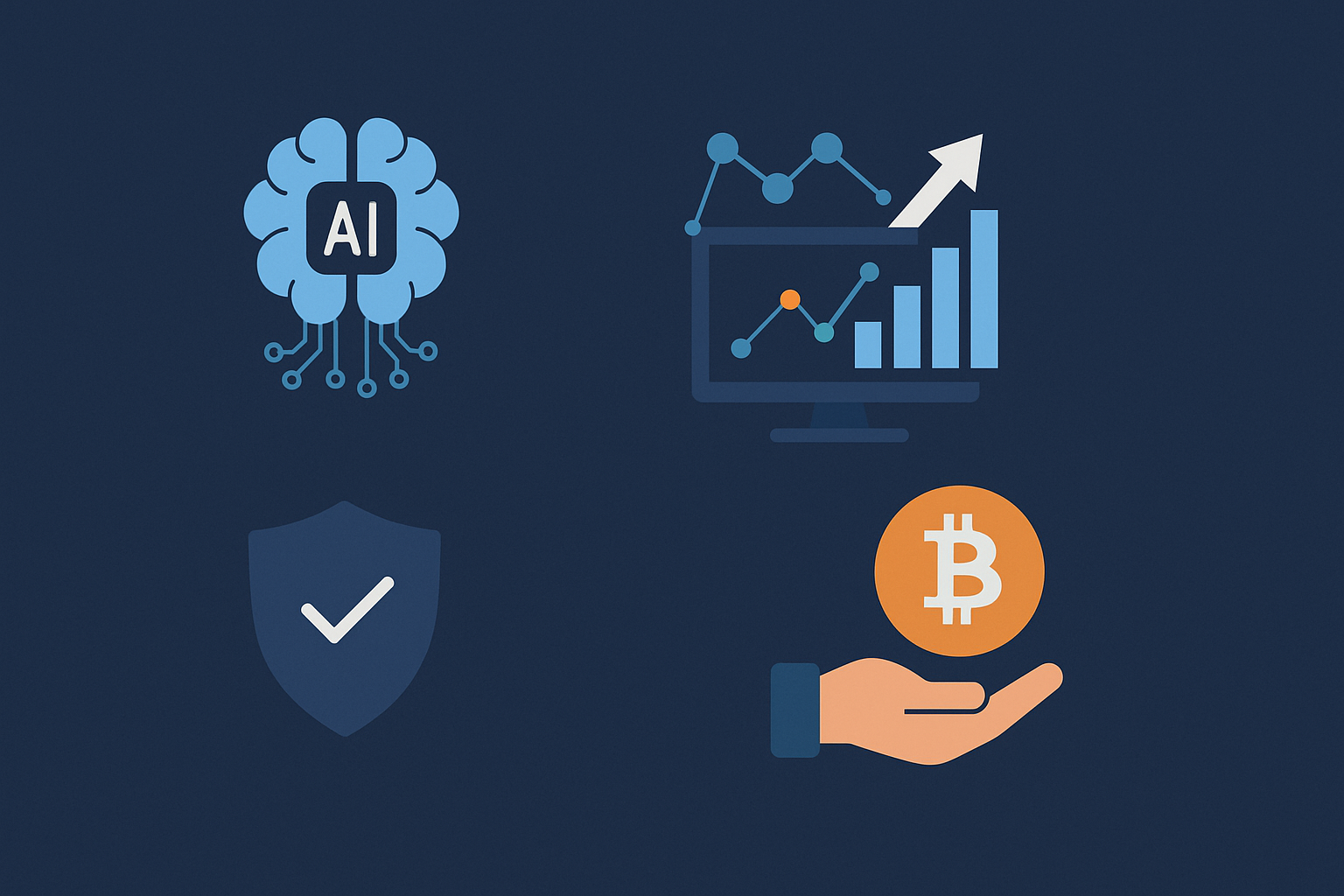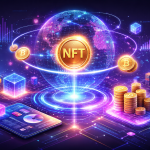Crypto Finance
Crypto Finance Firms Embrace AI For Risk Management And Strategic Growth

Introduction
In the rapidly changing landscape of digital finance, artificial intelligence is no longer a futuristic concept—it is the driving force behind innovation, stability, and competitiveness. As the cryptocurrency sector matures, leading crypto finance firms are increasingly adopting AI-driven solutions to mitigate risk, enhance decision-making, and streamline operations. From fraud detection and algorithmic trading to risk assessment and regulatory compliance, AI is redefining how crypto businesses operate.
This article explores how crypto finance companies are using artificial intelligence as a critical tool for growth and security. By understanding its multifaceted applications, we can grasp the profound impact AI is having on the future of crypto.
The Need For Risk Management In Crypto Finance
The cryptocurrency industry, although lucrative and innovative, is notoriously volatile and complex. Prices can swing wildly within hours, and the absence of traditional safeguards makes it an ideal ground for fraud, scams, and market manipulation.
Crypto lending platforms, exchanges, and decentralized finance (DeFi) protocols must constantly address a unique set of risks including:
Cybersecurity threats.
Volatile asset prices.
Regulatory uncertainty.
Counterparty risk.
Smart contract vulnerabilities.
Traditional tools and manual oversight are often insufficient to manage these risks in real time. This has opened the door for artificial intelligence to play a transformative role.
AI In Fraud Detection And Prevention
Fraud remains one of the most significant threats in crypto finance. The sector has been riddled with phishing schemes, fake tokens, rug pulls, and security breaches. AI technologies are now being deployed to counteract these challenges.
AI-powered systems can continuously monitor user behavior on platforms, flagging suspicious transactions or login patterns. These systems use anomaly detection algorithms that learn normal user behavior and highlight deviations that could signal fraud.
For example, some exchanges and wallets are now leveraging machine learning models trained on millions of transactions. These models assess whether a transaction matches typical user behavior, geo-locations, or known fraud indicators. Once flagged, further human or automated interventions are triggered to freeze accounts or pause suspicious activities.
Furthermore, some decentralized platforms are using AI-powered smart contract auditing tools that simulate various attack vectors and identify vulnerabilities before code is deployed.
Enhancing Loan Risk Assessment With Machine Learning
One of the fastest-growing areas in crypto finance is crypto-backed lending. Platforms allow users to stake digital assets as collateral to borrow fiat or stablecoins. However, this model introduces unique risk management challenges, especially when it comes to asset volatility and borrower reliability.
AI has enabled these platforms to refine credit scoring models, even in the absence of traditional financial history. By analyzing wallet activity, transaction patterns, borrowing behavior, and on-chain data, machine learning models can assign creditworthiness to borrowers. This allows platforms to optimize collateral requirements and reduce default risk.
Additionally, real-time data feeds allow AI systems to automatically trigger liquidation of collateral when values drop below a certain threshold. This instant, automated response protects platforms and other users from cascading losses during market crashes.
AI In Predictive Market Analysis And Trading
Crypto trading is dominated by high volatility and constant 24/7 market activity. Retail investors and institutions alike now rely on AI-powered trading bots and predictive models to stay competitive.
Artificial intelligence excels at detecting patterns in large data sets—something that is highly valuable in crypto, where millions of trades, tweets, and news stories impact prices daily.
These systems analyze:
Historical price data.
Social media sentiment.
On-chain transaction flows.
Market liquidity.
News headlines and events.
By synthesizing this data in real time, AI models generate actionable insights, automate trades, and even adjust strategies on the fly. Some hedge funds and institutional desks use reinforcement learning models that improve themselves over time based on market conditions.
What makes AI particularly powerful is its ability to respond faster than human traders. In a market where milliseconds can make a difference, algorithmic trading bots are often the first to execute profitable strategies.
AI And Regulatory Compliance In The Crypto Sector
The regulatory landscape for cryptocurrencies remains fluid and uncertain. Governments around the world are scrutinizing stablecoins, decentralized finance, and token issuance more closely than ever before. For crypto companies, non-compliance can result in heavy fines or loss of licenses.
This is where AI plays a vital role in regulatory technology, or RegTech. AI-powered systems help crypto firms remain compliant by automating:
Know Your Customer (KYC) procedures.
Anti-Money Laundering (AML) checks.
Transaction monitoring for suspicious activities.
Real-time regulatory reporting.
Machine learning algorithms can assess customer data against global watchlists and sanction databases in seconds. They can also continuously monitor for signs of money laundering, such as large transfers between anonymous wallets, or cyclical transaction patterns across multiple assets.
Blockchain analytics firms are also employing AI to trace stolen funds, link wallet addresses to real-world identities, and provide law enforcement with forensic-level insights.
Smart Contracts And DeFi Security with AI
The rise of decentralized finance brought a new layer of risk: smart contract vulnerabilities. Billions have been lost due to bugs or exploits in DeFi protocols. Since smart contracts execute autonomously and are often immutable, preventing vulnerabilities before deployment is critical.
AI is now being used to automate smart contract audits. These tools simulate various attack scenarios, review code syntax, and analyze past exploits to detect weaknesses. Some platforms are using natural language processing (NLP) to translate contract terms into readable summaries for human oversight.
In addition, AI models are embedded into DeFi protocols to dynamically adjust interest rates, manage liquidity pools, and reduce impermanent loss. These intelligent agents help maintain protocol health while responding to market conditions faster than manual management could.
AI-Powered Customer Service And User Experience
Another often-overlooked application of AI in crypto finance is customer interaction. As platforms scale, handling user inquiries, disputes, and onboarding becomes increasingly difficult.
AI chatbots powered by natural language processing are now used to address common user questions, guide new users through onboarding, and even troubleshoot wallet issues. Some advanced systems use sentiment analysis to prioritize frustrated or high-value users for human intervention.
AI tools are also being used to personalize the trading experience by providing tailored insights, watchlist alerts, and portfolio recommendations based on user behavior.
Case Study: AI Integration At Leading Crypto Firms
Several top crypto finance firms have taken the lead in integrating AI across their operations.
Binance, the world’s largest exchange, uses AI to monitor user activity for fraud, ensure platform scalability, and optimize its order matching engine.
Compound Finance, a DeFi lending protocol, has integrated AI agents to automate liquidity management, detect liquidation thresholds, and balance interest rate models in real time.
Chainalysis and Elliptic, leading blockchain analytics firms, use AI to identify wallet patterns, monitor illicit funds, and provide KYC/AML tools to exchanges and governments.
Aave, another major DeFi protocol, has tested AI-driven governance suggestions based on community sentiment and network data.
These examples demonstrate how AI is not a fringe add-on, but a strategic necessity in today’s crypto finance ecosystem.
The Future of AI In Crypto Finance
As blockchain systems become more complex and integrated into global finance, AI’s role will only grow. The future likely includes:
Autonomous crypto investment advisors.
AI-driven DAO governance systems.
On-chain AI agents executing tasks without human input.
Hyper-personalized financial services in DeFi.
However, the expansion of AI also raises ethical and operational concerns. Transparency, accountability, and data privacy must be embedded into AI models. Regulatory bodies may also begin setting standards for how AI is used in financial applications.
Crypto firms will need to balance innovation with responsibility, ensuring that AI does not become another vector for manipulation or exploitation.
Conclusion
Artificial intelligence is revolutionizing crypto finance, offering solutions to some of the industry’s most persistent challenges—from fraud detection and loan risk to trading, compliance, and automation. As digital assets continue to gain mainstream adoption, AI will serve as the backbone of efficient, secure, and scalable operations.
For crypto finance firms, the choice is no longer whether to adopt AI, but how to do so responsibly and effectively. Those that embrace this shift will not only improve operational resilience but will also lead the next chapter of innovation in digital finance.











